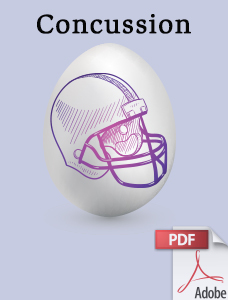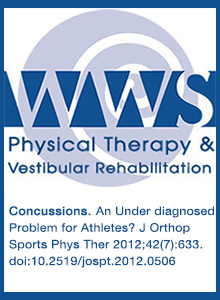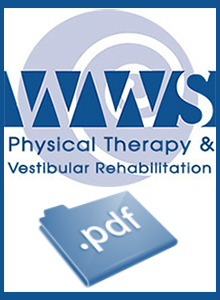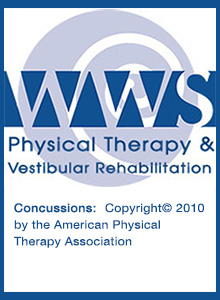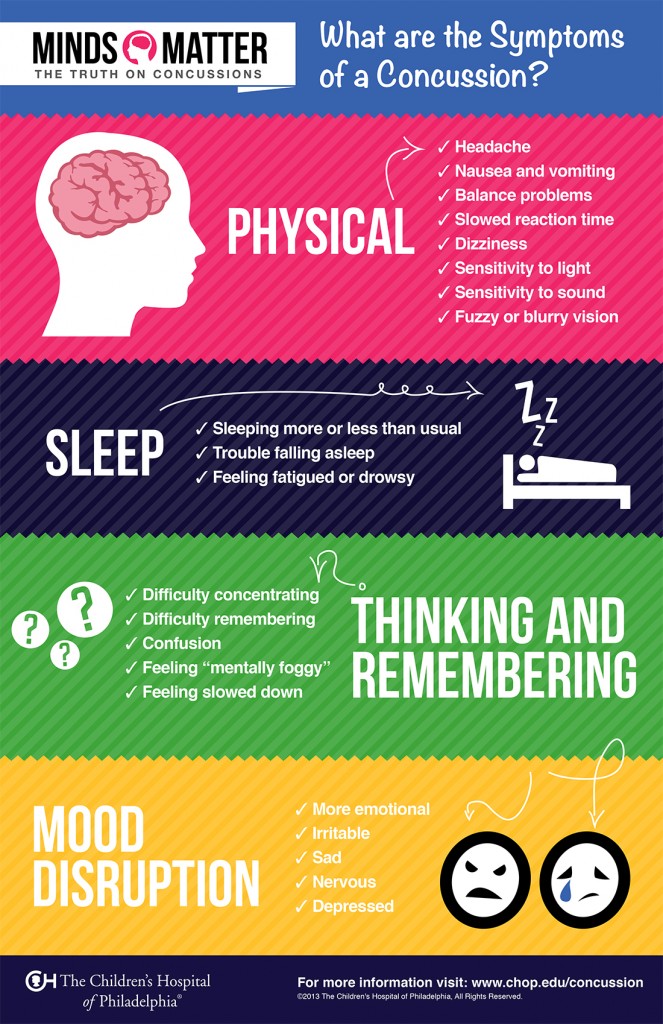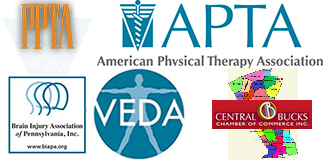Physical Therapy for Concussion

A Concussion is a Brain Injury that interferes with regular brain functioning whether that is schoolwork, sports or work.They are caused by a blow to the head or blow to the body that results in a whiplash of the head. What used to be brushed off as “getting your bell rung”, we now know can be serious especially if not recognized and a second impact occurs.
The awareness of concussions has increased and more levels of concussion are being recognized. Most athletes don’t realize they have suffered a concussion until later, when their headaches don’t go away. Not all concussions cause a loss of consciousness, it is more common that an athlete feels dazed or “slowed”. Symptoms a parent, guardian or coach may observe in an athlete include poor coordination, personality changes, memory issues, and drop in academic performance. Symptoms the Athlete may report include headaches, dizziness, nausea or vomiting, blurred vision, concentration problems, or a vague complaint of a foggy feeling.
What can Physical Therapy do to speed recovery from concussion?At WWS Physical Therapy, our Physical Therapists are specialists in treating concussions and have been involved in treating the patients for 10 years. Because of the expertise in Vestibular Rehabilitation and knowledge in Vision exercises, we have been able to work with concussion effectively to speed recovery for the patient. We have been educators to the local athletic directors, guidance counselors and school nurses,working with them to develop safe “Return-to-learn” and “Return-to-play” guidelines for each the districts and each student individually. We create customized treatment plans for each patient with a focus on specific goals such as improved reading tolerance for return to school, decreased headaches and dizziness and high level reactive balance to allow return to sports safely.
Our specialized program incorporates balance and Vestibular Rehabilitation. Vestibular Rehabilitation is …. Initially the cornerstone of post-concussion care is REST. The patient often does not begin rehab until 2-3 weeks after the event. We then evaluate the patient’s provocation of symptoms with a thorough neurological evaluation to include visual testing, balance assessment, cognitive related symptoms and reaction to exertion. Athletes are introduced to a 5 Stage Post Concussion Program developed at University of Pittsburgh. Treatment includes visual and vestibular exercises, coordination activities, balance conditioning, and sport specific tasks. All treatment and aerobic exercises are closely monitored for any symptoms. To facilitate recovery a home exercise guideline is provided and the patient and parents are educated on how to manage symptoms.
If you think you or your child has sustained a concussion and is having some of the symptoms mentioned, it is important you call immediately for an evaluation. We make every effort to schedule these cases promptly and we work closely with other healthcare professionals such as Pediatricians, Neurologists, Neuropsychologists, Family Practitioners and Athlete Trainers.
Medical assessment by a primary care physician or neurologist may be necessary to help determine if migraine headaches are present and if medication is needed to improve recovery. A vision examination by an optometrists or ophthalmologists may be needed if there are ongoing problems with reading and computer related tasks due to continued abnormal eye-tracking. The optometrists and ophthalmologists consulted should have completed residency programs in vision therapy and rehabilitation.
Feel free to DOWNLOAD WWSPT’s Concussion Brochure to learn more about Concussion Treatment & Therapies:
For Additional Information Go Through the – FAQs (Frequently Asked Questions):What happens to the Brain and Vestibular System after concussion?
Concussion events cause a quick deceleration of the head and shifting of the delicate brain tissue inside the skull. The typical concussion causes a rotational force which occurs with an impact to the right or left side of the forehead. When the body is traveling forward or facing forward in a still position, and a force occurs off center, the brain sustains a rotational sheer force, which causes more trauma to the brain and a more severe concussion. Loss of consciousness and nausea at the time of injury are signs that rotational forces have occurred.
Concussions do not only occur in children and in sports. Falls or motor vehicle accidents that involve a blow to the head or body and whiplash type injuries can also lead to a concussion. The symptoms are the same for an athlete, it just may not be recognized. These patients benefit from Vestibular Rehabilitation as well.
Current research shows that nerve signals in the brain are disrupted for 30 days after a single concussion. During this period reaction time and brain processing are not normal therefore people are less likely to see a ball coming toward the head and are more likely to have another injury if they engage in sports activities. The symptoms are typically worse and recovery time longer if more than one concussion occurs.
Trauma to the brain can cause abnormal vestibular system function. The brain can receive incorrect signals regarding the position and movement of the head in space. The visual system can also develop deficits in eye convergence (teaming) and tracking activity used in reading. When vestibular information is inaccurate, the brain often relies more on visual input to stabilize the head on the body. If this system is also inaccurate the mismatch leads to symptoms of headaches, dizziness, nausea, blurred vision and imbalance. This can result in fatigue and difficultly with routine daily activities.
How do I know if my child has a concussion?A concussion injury does not appear on any routine CT or MRI brain scan and there is no diagnostic test for concussions. A diagnosis of concussion is based on a group of symptoms that present immediately or may arise over weeks to months after the injury. Acute symptoms can be present for one to two weeks following the concussion during which time brain rest with limited activity is recommended. If three or more of the following symptoms present within four weeks of injury it is classified as Post Concussion Syndrome:
How can I best cope with symptoms of concussion?
After two to three weeks of rest the best treatment involves an assessment of vestibular function by a qualified (trained) vestibular physical therapist. The vestibular physical therapist will complete a comprehensive vestibular evaluation including examination of balance, vision, coordination and proprioception. Proprioception reveals how the brain interprets body and head movement relative to space and visual surroundings. Knowing where your body is in space. An examination of the cervical spine will also be performed.
How can you prevent a Concussion?Every sport is different, but there are several steps that you can take to protect yourself from a concussion:
- First ensure that you are following the coach’s rules for safety, as well as, the rules of the sport.
- Always adhere to good sportsmanship at all times.
- Wear protective equipment, make sure that the equipment fits appropriately and also that the equipment is worn consistently and correctly.
- Lastly, it is very important to learn the signs and symptoms of a concussion.
What should you do if you think you child has had a concussion?
- Seek medical attention right away– A health care professional will be able to determine the severity of concussion and determine when your child can return to school and
- Keep your child out of play– Concussions take time to heal, so don’t let your child return to school or play unless the doctor gives permission. Children who return to play too soon are at greater risk of having a second concussion because the brain is still healing. The second concussion or future concussions can be very serious, potentially causing permanent brain damage and affecting your child for a lifetime.
- Report to your child’s coach about any recent concussions– Coaches may not know about your child’s concussion from another sport unless you tell them.
References:
This information is from multiple sources including:
Vestibular Disorders Association. Article: Concussion, When Recovery Is Complicated by Vestibular Involvement and How Vestibular Rehabilitation Can Help. By Nicole Miranda, PT, DPT. The full article, with all references, is available at www.vestibular.org
- Center for Disease Control
- University of Pittsburgh
- Penn State
- CHOP: Children’s Hospital of Philadelphia
Links and Educational Tools:
Please visit these links for more information:
- About Concussions
- Concussion Fact Sheets & Quizzes
Center for Disease Control – search concussion and see multiple sites with information on Traumatic Brain Injury, Sports Concussions, Heads Up: Concussion in High School Sports, Parent/Athlete Concussion Information Sheet and many more.
The Children’s Hospital of Philadelphia – search Concussion and find Concussion in Children and Adolescents. Currently this site has information for Families, Healthcare Providers, School Staff and Coaches. There is also a video of Frequently Asked Questions.
Mayo Clinic – search concussion
Penn State Center for Sport Concussion Research and Service
‘Concussions and Our Kids’, by Robert Cantu, M.D and Mark Hyman.
